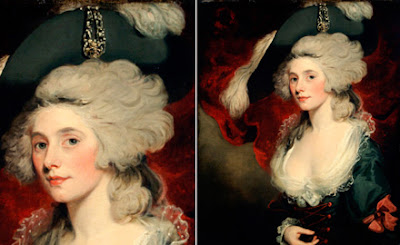The Selected Poems of Mary Robinson is now out from Shearsman – edited by me!
Publisher’s details HERE: Mary Robinson - Selected Poems (shearsman.com)
The publisher's sample of the book may be read here: mary-robinson-selected-poems-sampler.pdf (cdn-website.com)
During the proof-reading process, I have discovered another poem that I am removing from my selected poems of Mary Robinson. I have been writing about her poetry, about her life, and about my processes of selection on this blog for some months, and there is a hub post that contains links to the other pages. The life and the account of the poems is probably the place to start. Here’s the hubpost: Pages: Selecting for a Selected: The Poems of Mary Robinson 1 (robertsheppard.blogspot.com) . Here’s how I first encountered, and creatively transposed, her poems: this editorial project came out of my own use of her sonnets ‘Sappho and Phaon’ (the whole of which is in my selection) for my ‘English Strain’ project, which I explain here: Pages: My 'Tabitha and Thunderer' is published in Blackbox Manifold (robertsheppard.blogspot.com), and here, where you will also find lots of images relating to her life: Pages: My Transpositions of Mary Robinson's sonnets 'Tabitha and Thunderer' are now complete (hub post) (robertsheppard.blogspot.com). Oddly, I’m still referring to her work (and life) in my work. She appears in the poem I wrote for Iain Sinclair’s 80th birthday (Pages: I'm in IS80 a book for Iain Sinclair at Eighty (robertsheppard.blogspot.com) – at least Simon Kovesi picked up on my reference), and in my new poem on the blues. (See also my complaint to the Slavery Museum in Liverpool about their misrepresentation of her relationship with Banastre Tarleton (‘Thunderer’ of my sonnets): Pages: The Poems of Mary Robinson 7: anti-slavery poems and Slavery Remembrance Day (robertsheppard.blogspot.com). He pops up in my poem about the blues.Here is another removal, then. This poem I probably selected because of its bold replacement of image by words in a so-called ‘portrait’. Mary was literally much painted (as well as caricatured by the likes of Gillray). So it seemed fascinating to see that revisionary process at play, inner qualities elevated over physical beauty. However, re-reading it revealed it to be quite a thin poem, indeed a thin disguise (!), in that its unabashed ‘portraiture’ seemed self-serving (if intended unironically), even disingenuous. I wondered whether it was one of her persona poems. I could imagine Tabitha Bramble writing this ‘frank’ portrait. But evidence doesn’t suggest it was originally one of those. It first appeared in 1793, and the version I have is the shorter 1806 one, according to Judith Pascoe’s detailed bibliography. It’s probable this later version is censored, but I haven’t checked, since my editorial method dictates that I work solely from Mary’s 1806 POEMS. I’ve decided to leave it out. It’s biographically interesting, but as a literary artifice, rather than a biographical one, it’s not strong (and a selected poems must be strong, while evidencing writerly range). It’s worth reading, though. I still like the lines ‘When coxcombs tell me I’m divine,/I plainly see the weak design,’ though I think the final lines particularly uninspired.
Stanzas to a Friend Who Wished to Have My Portrait
E’EN from
the early days of youth,
I’ve
bless’d the sacred voice of truth –
And candour is my pride:
I always
speak what I believe;
I know not
if I can deceive –
Because I never tried.
I’m often
serious, sometimes gay,
Can laugh
the fleeting hours away,
Or weep for others’ woe:
I’m proud!
this fault you cannot blame,
Nor does
it tinge my cheek with shame:
Your friendship made me so.
I’m odd,
eccentric, fond of ease,
Impatient,
difficult to please;
Ambition fires my breast:
Yet, not
for wealth or titles vain;
Let but
the LAUREL deck my strain,
And dullness takes the rest.
In temper
quick, in friendship nice;
I doat on
genius, shrink from vice,
And scorn the flatt’rer’s art:
With
penetrating skill can see,
Where,
mask’d in sweet simplicity,
Lies hid the treach’rous heart.
If once
betray’d, I scarce forgive;
And tho’ I
pity all that live,
And mourn for ev’ry pain,
Yet never
could I court the great,
Or worship
fools, whate’er their state;
For falsehood I disdain.
I’m
jealous, for I fondly love;
No feeble
flame my heart can prove,
Caprice ne’er dimm’d its fires:
I blush to
see the human mind,
For
nobler, prouder claims design’d,
The slave of low desires.
Reserv’d
in manner, where unknown;
A little
obstinate, I own,
And apt to form opinion;
Yet, envy
never broke my rest,
Nor could
self-int’rest bow my breast
To folly’s base dominion.
No gaudy
trappings I display,
Nor meanly
plain, nor idly gay,
Yet sway’d by fashion’s rule;
For
singularity, we find,
Betrays to
ev’ry reasoning mind,
The pedant or the fool.
I fly the
rich, the sordid crowd,
The little
great, the vulgar proud,
The ignorant and base:
To sons of
genius homage pay,
And own
their sov’reign right to sway –
Lords of the human race.
When
coxcombs tell me I’m divine,
I plainly see the weak design,
And mock a tale so common:
Howe’er
the flatt’ring strain may flow,
My faults,
alas! too plainly show,
I’m but a mortal woman!
Such is my
portrait now believe;
My pencil
never can deceive,
And know me what I paint.
Taught in
affliction’s rigid school,
I act from
principle, not rule,
No sinner, yet no saint.
Locating Robert Sheppard: email: robertsheppard39@gmail.com (don’t use the Edge Hill email); website: www.robertsheppard.weebly.com Follow on Twitter: Robert Sheppard (@microbius) / Twitter latest blogpost: www.robertsheppard.blogspot.com



